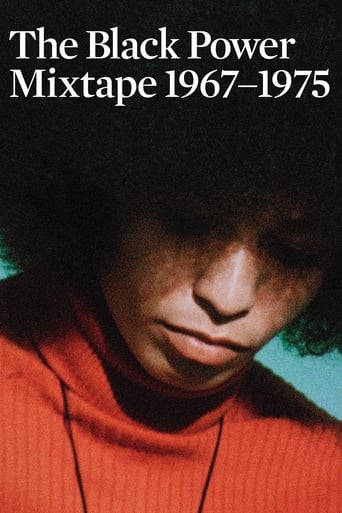lynnfriedman
The Black Power Mix Tape 1967 – 1975 is a fascinating documentary consisting of present day interviews mixed with 30 year old archival footage shot by a Swedish team and never seen in the US. This chronicle of the Black Power movement in the United States from 1967 to 1975 gives us the cultural and political back story from the point of view of prominent African Americans. The original music is by Questlove and Om'Mas Keith. While this is serious stuff, there are a few unintentionally amusing bits thanks to the curiosity and naive eyes of Swedish journalists. TV Guide, that's all i'm going to say. Much of the story takes place in the San Francisco Bay Area and includes amazing moments with Stokely Carmichael, Angela Davis, Huey P. Newton, Eldridge Cleaver and Bobby Seale. Local actor Danny Glover is co-producer.
abundidi1184
For someone who thrived during this era, it was a nice refresher course. I started college in 1967, and was able to see and even meet some of the principles of this era. For young people it is a must see movie. It is the US seen trough Swedish eyes. I gave it high marks because mostly what is shown these days about the struggle of the 60's is Martin Luther King. There were many more, who got coverage at the time. Some of them were revered as much as Martin Luther King. It draws few conclusions except for the epidemic of drugs in the Black community for the Radicalisms demise. In my opinion, many of the radicals went capitalist. Bobby Seale, Eldridge Cleaver turned main stream. I bought a cookbook by Bobby Seale in the 80's. Despite its flaws, this movie is history that you will never see in the history books.
treywillwest
A bunch of Swedish lefties became idealistically preoccupied with American Black nationalism in the late '60s, and shot a ton of footage intended for Swedish television. Much of it wasn't used, however, and the filmmakers have only recently finished editing it into a feature. Much of this is powerful. Stokley Carmicheal's presence impressed me most of all. I didn't feel as if anything in the film felt unnecessary, except perhaps a petty feud with TV Guide for criticizing Sweedish television, which I doubt was at the center of consciousness of many African-American activists of the time. The trajectory of the film is depressing. We witness a leftist renaissance in the USA crumble as drugs (which the film forcefully suggests were introduced by the FBI) change the escape route of an oppressed community from activism to addiction.
stensson
This era has since long legendary status, not just in American history, but all over the world. It seems like a saga now; this radicalism, this possibility of seeing even socialism as a possible alternative in the US. It was not just about race issues, it was also about the economic and political system.During these years, Swedish television many times went over to the States, interviewing black radical leaders. We meet Stokely Carmichael, Eldridge Cleaver and in a very unique sequence also Angela Davis in prison. Most of it takes place after the backlash in the late 60s. The movement was deradicalised and we meet the fighters talking about big changes, but you have the feeling that they've lost most of their faith in it. It's a big difference compared to the attitude of Stokely Carmichael during his Stockholm visit in 1967.Very interesting material, but you miss the analysis. Why was the movement deradicalised? It was not just because of police brutality during riots or supposed FBI actions. And you don't get any explanation about why the movement and other powers had success when it came to reducing racism. There's anyway another USA today, compared to what it was in 1967.




